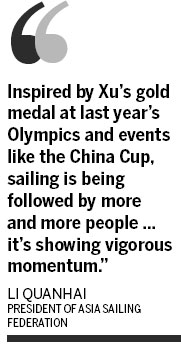

International success has sparked a sailing resurgence in China, Sun Xiaochen reports in Shenzhen.
Hundreds of years after Admiral Zheng He's historic expeditionary voyage, sailing is again emerging as a source of pride for the Chinese.
According to organizers and sailors at the 7th China Cup International Regatta, the success of local events and the 2008 Beijing Olympics awakened China's long-dormant enthusiasm for the sport, and now the nation is narrowing the gap with traditional sailing powers.
"Sailing is rooted deeply in the spirit of Chinese as our ancestor Zheng's great journey to east Africa in the 15th century impressed the world," Yao Xinpei, secretary-general of the Chinese Yachting Association, said during the China Cup at the Shenzhen marine sports base on Friday.
|
China's Vanke Longcheer team sails during the final-day race of the China Cup International Regatta at Daya Bay in Shenzhen on Monday. Provided for China Daily |
"And now with the China Cup drawing more and more interest, both international and domestic, maritime sports have regained public attention."
The China Cup attracted 100 boats from 35 different nations and regions to race in four divisions.
In a carnival atmosphere reminiscent of Auckland or Monte Carlo, large crowds heartily cheered the returning fleet while sailors celebrated the competition.
The list of entrants included Australia's Nathan Wilmot, the 2008 Beijing Games gold medalist in the 470 class, and Xu Lijia, China's gold medalist in Laser Radial at last year's London Games.
After four days of racing, featuring rally, course and island-circling events, China's Vanke Longcheer claimed the championship in the one-design first 40.7 class while Team Vatti representing China and Team Yo! from the United Arab Emir ates finished second and third respectively.
For the local crews, working with top-notch international teammates offered a great opportunity to hone their skills.
"For me, sailing with an international crew on a much bigger boat was a whole new experience and I've learned a lot that I couldn't learn on solo sail," Xu said after helping her CYA Vatti team finish fourth in the one-design soto 27 category.
Jono Rankine, skipper of Team Vatti, said the high-level exposure is critical for young Chinese sailors.
"Events like this where you've got medalists from the Olympics or Worlds sailing besides you, you've got the chance to watch and learn what these guys do, an opportunity to absorb some knowledge. This is the key for China sailing to improve," said the veteran New Zealand sailor.
The public's growing acceptance of the sport which used to be considered only for the social elite in coastal regions matters more than results, said Li Quanhai, president of the Asia Sailing Federation and director of Water Sport Administrative Center of China.

"Inspired by Xu's gold medal at last year's Olympics and events like the China Cup, sailing is being followed by more and more people it's showing vigorous momentum," said Li.
According to figures from the China Cruise and Yacht Industry Association, there are now 46 yacht and sailing clubs in the country, which berth 6,404 boats. The growth of facilities has lowered the cost for prospective sailors participating in rudimentary levels like the optimist class (small boat for juniors) and opened up the sport for those living inland to practice on lakes.
"Sailing is no longer a high-end sport far from the public; it's actually affordable for most middle-class families," said Yao.
But there remains a wide sea between China and the world sailing powers.
"Each year, I see Chinese sailing growing but very slowly. They are getting their names out there and doing more and more work, but they need to keep sailing at the international level and grow with it. It's still a relatively low number of Chinese names (on the world circuit)," said Rankine.
Thierry Barot, CEO of China Team Challenger for the prestigious 34th America's Cup, echoed Rankine's sentiment.
"It's very interesting because China has 18,000 kilometers of sea coast, which is very important. But the sailing population was not impressive because people consider the sea more like a working site," said Barot.
"But there are a lot of positives for Chinese sailing. Xu's success last year was amazing; it almost started from nothing and now she is the best female sailor in the world. It generated a lot of inspiration for young people.
"More Chinese will get interested and go on the sea for pleasure and racing."
(China Daily 10/30/2013 page23)